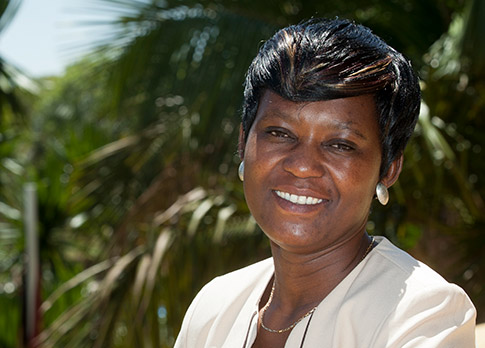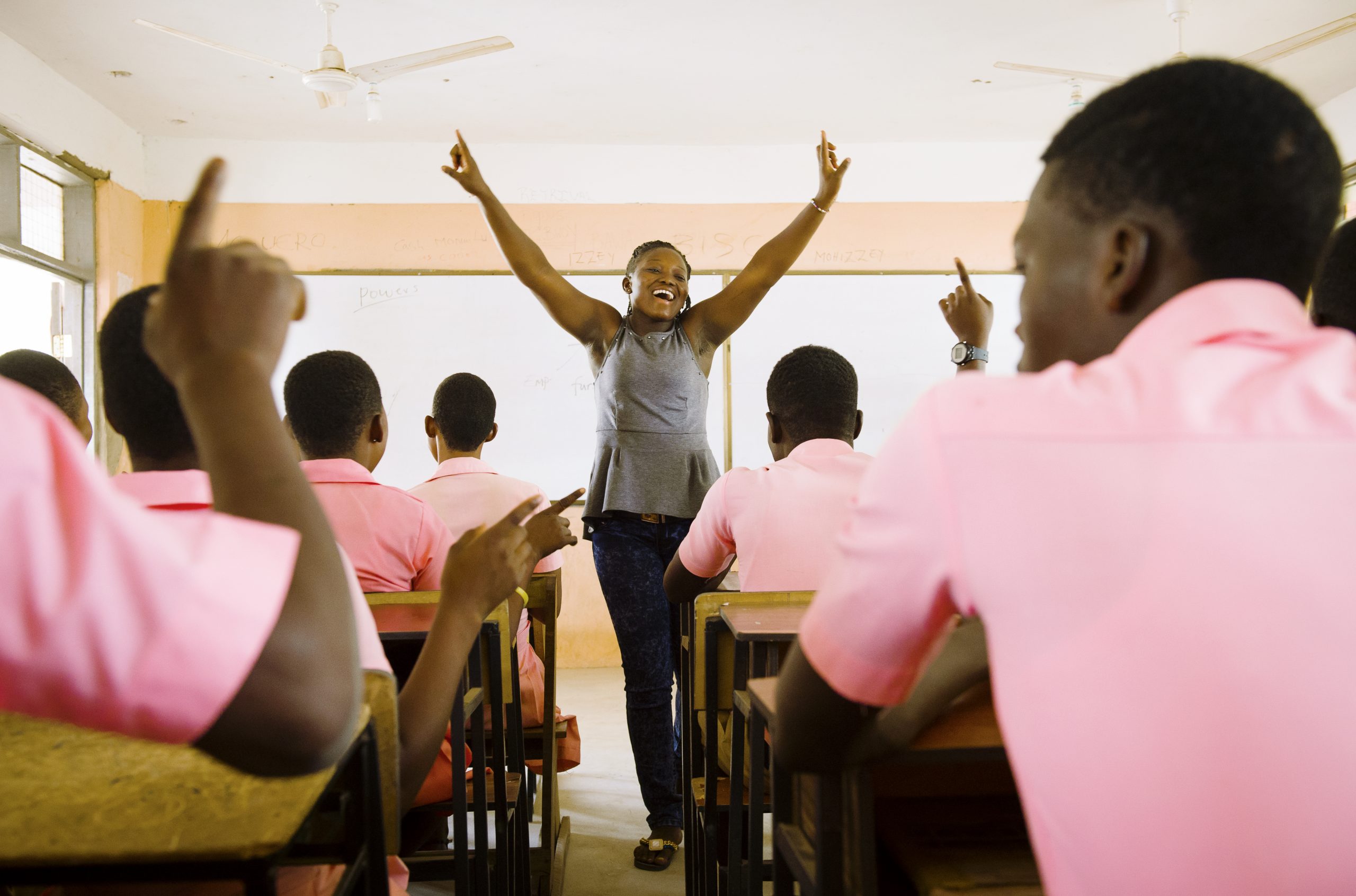I grew up in rural Chikomba District in Zimbabwe, with my poor parents who had no means of getting an income to pay for my school fees or enough food for the family. (In Zimbabwe families have to pay school levies and exam fees. At secondary level, these rise, as students also need to purchase school uniforms and other school materials).
My primary school was a hard journey to complete, due to challenges in meeting my school-going needs. I would travel the long distance to school in the morning dew, and often be turned back home to collect fees, which I could never pay in full – often not at all. Thorns would prick the soles of my bare feet and walking long distances also made me very tired, so I found it hard to concentrate in school. Being sent home to collect fees was so disturbing to me, both in terms of losing time to attend lessons, and the stigma attached.
I went to school barefoot, until I got my first pair of shoes when I was 11 years old. My mother had found them in the forest whilst looking for firewood; she had kept them for a while to look for the owner but no one claimed them. That was my first footwear.
It was a miserable life, since I lacked fees and enough food. Always being hungry at school also made it difficult to concentrate on my schoolwork. I would exchange a few mangoes that I carried for my lunch to get some stationery, but this left me hungry. I had very few friends. I had no hope for my future. All this affected me psychologically, although I was an intelligent girl and a hard worker, and even served as head girl in the last year of primary school.
I had sleepless nights as I was about to go to secondary school. If it was hard for me in primary school, how could I make it to secondary school, where more fees were needed? I am ever grateful to CAMFED, which came to my rescue and paid my fees and met my school-going needs from Form 1 up to Form 6 (lower and upper secondary school). It bought me stationery and bed sheets, since I was in boarding school at secondary level, where you have to bring your own supplies. I also received school uniforms and shoes and socks.
The CAMFED team would visit us at school to encourage us, and hear us out, for in the early days there were no formal structures, like the district committees and the CAMFED-trained Teacher Mentors that we have now. These visits left us strong. The school administration and the boarding matron offered us support throughout. Security of education meant a lot to me. I worked harder and felt on par with other learners. I had friends and mixed with others well. I was appointed head girl in Form 4 and Form 6.
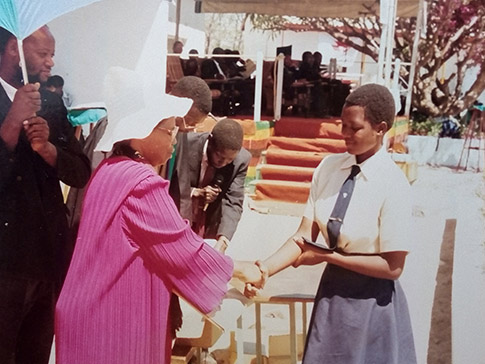
Lucia receives a prize at secondary school following support from CAMFED.
Hope of finishing school boosted my confidence to work hard. I got the determination to go far with my education. I came out of school a changed person.
After finishing school I went back and stayed with my family at our rural home. I managed to get a little money and started a small business, buying and selling. I sold through the barter trade, where I would exchange combs, bath towels, rat poison – things that the community needed – for bags of maize to stock. I then got employed as a relief teacher at a local school for less than a year. I used the salary I got to start a poultry business. I then used the profit I got, and remnants of my salary, to pay for my college fees, where I trained as a Mathematics teacher. (Later I also studied for my other two degrees – Bachelors of Commerce in Human Resources and Public Relations.)
I gained employment as a teacher at Kwenda Mission School, the school where I did my O-levels. I really feel great to be a female Math teacher at the school I myself learned at. I am like a big sister, encouraging other girls that passing Mathematics is not gender-based. Everyone is capable of passing Mathematics. I chose Math in order to prove it to other girls that we can do it. I am also the school’s Teacher Mentor, offering psychosocial support to learners, as well helping them to run the Student Council. I enjoy my work.
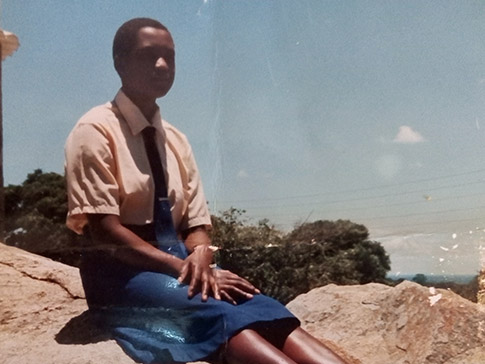
Lucia as a student, pictured outside her secondary school in rural Zimbabwe.
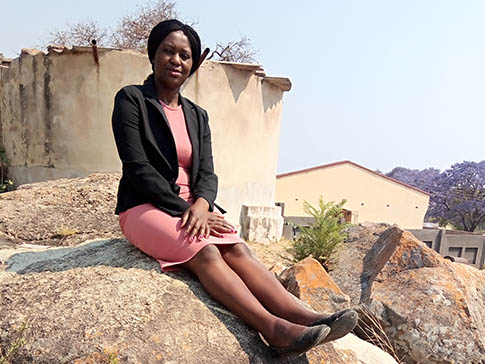
Lucia sitting on the same rock, after she became a teacher at her former school.
I see a lot of “Lucias” – girls just like me, who are really in need. I hope I inspire them the way my sisters in the CAMFED Association inspire me every day.
I’m a founding member of the CAMFED Association of women leaders educated with CAMFED support, CAMA, in Zimbabwe. We started as 400, and by 2022 we were more than 77,000 in Zimbabwe, with nearly 208,000 across 5 African countries – including Ghana, Malawi, Tanzania, and Zambia.
Still an active member, I always attend area meetings. We meet once a month to discuss issues affecting us young women, sharing successes, challenges and oftentimes coming up with tangible solutions, such as identifying child-headed families, orphans and vulnerable people, and paying school fees for them and giving them stationery. Once I adopted a child-headed family until the parents resurfaced from South Africa. They had gone there to try and look for work in order to alleviate poverty.
I also contribute monthly to the CAMFED Association’s philanthropy fund (CAMA Fund), which goes a long way in assisting the disadvantaged we have identified in our communities. We club together because, due to economic hardship, sometimes the money we as individuals have spare might not be enough to buy a whole school uniform, but when we put our money together as sisters we can help significantly.
Women are generally hard workers and have a tendency of wanting to take care of other people, especially the disadvantaged. We share what little we have.
I am inspired by my other CAMFED Association sisters. We have WhatsApp platforms where we share our activities both at individual level and at group levels and at national and global level. Seeing others do new things makes me want to do more and encourages me that this really works – we are really leading change!
As a Teacher Mentor, I have also worked with CAMFED Learner Guides. These are my fellow sisters in the CAMFED Association who offer social support to students in school, delivering life and learning skills, and helping them to conquer their challenges, both at home and at school – challenges we ourselves have experienced.
I also connect learners graduating from school with CAMFED Transition Guides, who are ensuring a safe journey for girls leaving school into the world, helping them start a small business, find employment or get into further education. As a business lady I am a role model to other CAMFED Association sisters.
As members of the CAMFED Association we understand the importance of continued support for girls when they graduate from school – we have that road map now, which did not exist for the first group to graduate with CAMFED support.
I am a Business Guide, volunteering with CAMFED to mentor other business ladies to start up businesses, as I have many years of experience. To supplement my income I run a general dealer shop with a female business partner who is also my friend. I sell groceries (like seasonal vegetables, tomatoes and eggs) stationery, clothing and other items. I also keep broiler chickens, and buy and sell anything I see as being in demand in my community.
I have four children of my own, who are all attending school through my support. The eldest is at university now; two are in secondary school, and the youngest is about to finish her primary school.
We have experienced the benefits of education, hence we want others who don’t have the resources to benefit too… multiplying what CAMFED gave us!
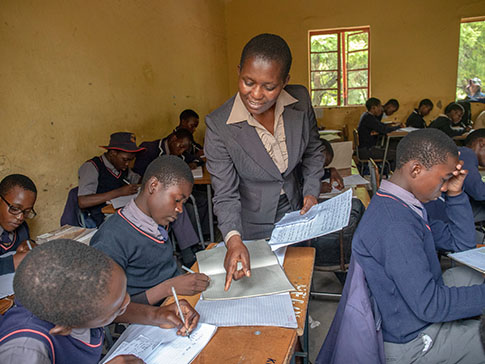
Lucia is noteworthy as a female mathematics teacher in her rural community in Zimbabwe. (Photo: Cynthia R Matonhodze/CAMFED)
Education eradicates so many challenges, including child marriage and early pregnancy, and the difficulties of children born into such situations are lessened. Literate women can occupy influential positions in society, where they can pass important policy decisions that free womankind. In as much as men stand for women, it is not the same as if women do it on their own — they have felt the pain of some decisions that men impose on them due to the fact that men do not know how it feels to be female in this society.
Because more men than women are educated in Africa, it follows that men are more influential in their positions and are given more chances to air their views and pass judgements. Our hope of breaking barriers lies in educating girls and women. This will bring green pastures of gender equality.
Ensuring that women and marginalized individuals within my community have equal rights is one of my passions.
I have been driven by the fact that securing a right yourself breaks barriers and loosens the things that tie us down as people, especially as women. Getting educated is a right. It is a right that will untie us as women from the snares of such things as gender inequality. Poverty cycles will be broken. Educate a girl and you educate the whole nation and the world. Break barriers and open paths to walk through for the next generation. Be role models and inspire.
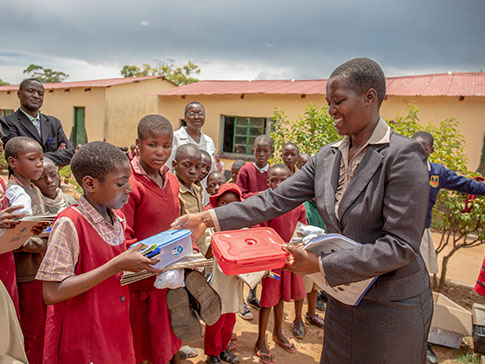
Like her CAMFED Association peers, Lucia engages in community philanthropy to support the most marginalized. (Photo: Cynthia R Matonhodze/CAMFED)
In future, I hope to be a great businesswoman in Chikomba District; to be a great philanthropist to those in need; to inspire women in different areas and capacities; and to see poverty eradicated and women getting the same opportunities as men by ensuring their education.
Being an educated woman raises my self-esteem and it is the master key to me unlocking so many doors, as I am literate and the skills I have learnt at school help me to explore other lucrative avenues.
Being a business lady who knows what she is doing makes me feel my best self.
Seeing others going to school due to my help; mentoring others socially, psychologically, physically and even spiritually gives me confidence that I am making lasting change and giving back to my community.


